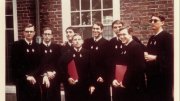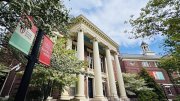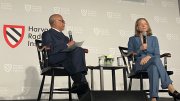The Radcliffe Institute for Advanced Study’s 2020-2021 cohort, announced today, includes 42 fellows representing six countries. The acceptance rate for the incoming class was 2.8 percent, from a pool of nearly 1,400 applicants.
Radcliffe is planning a virtual fellowship at this time, with the possibility of a residential component, pending decisions on Harvard-wide policies by University leaders, informed by epidemiological models of the spread of COVID-19 in the United States.
“This fellowship class, taking shape amid a devastating pandemic, reflects our conviction that the cross-disciplinary exchange and deep exploration that Radcliffe enables are critically important for Harvard and for the wider world—especially in times like these, when we must confront unprecedented challenges,” said Radcliffe dean Tomiko Brown-Nagin.
Claudia Rizzini, the new executive director of the fellowship program, will welcome her first class to the Radcliffe community under less-than-ideal circumstances. But her excitement for their potential as creators and researchers, both in individual pursuits and as a group, is undiminished. “This is a special class of fellows, joining the Radcliffe Institute at a challenging time in history,” she said. “I look forward to welcoming our fellows and working with them to build a dynamic community that enriches their projects.”
Nine of the fellows are Harvard faculty members, who are listed below with their projects:
- Christina L. Davis, Wallach professor of political science, professor of government: “Entry and Exit: How Membership in International Organizations Transforms International Cooperation”
- Cynthia Dwork, Radcliffe Alumnae professor of computer science, professor of computer science: “Pseudo-Randomness and the Crystal Ball: A Complexity-Theoretic Investigation of Individual Risks and Probabilities”
- Jarvis R. Givens, Murray assistant professor of education: “The American School in Red, White, and Black”
- David Hemenway, Cashin Fellow, professor of health policy: “Guns and Public Health”
- Torben Iversen, Gellert Fellow, Burbank professor of political economy: “The Data Revolution and the Transformation of Social Protection”
- Shawon Kinew, Shutzer assistant professor of art history, “Baroque Softness: Melchiorre Cafà and the Sculpture of Mysticism”
- Robert F. Reid-Pharr, Pforzheimer Foundation Fellow, professor of studies of women, gender, and sexuality and of African and African American studies: “James Baldwin: The Making of an American Icon”
- Kristen A. Stilt, Green Fellow, The Custodian of the Two Holy Mosques professor of Islamic legal studies: “Halal Animals: Food, Faith, and the Future of Planetary Health”
- Lauren K. Williams, Seaver professor at the Radcliffe Institute, Robinson professor of mathematics: “Cluster Algebras, Tropical Geometry, and Physics”
And three are Harvard graduate students:
- Amsale Alemu, Shapiro Graduate Student Fellow: “Ethiopian Revolution on Campus”
- Ruodi Duan, Radcliffe Institute Graduate Student Fellow: “The Politics of Afro-Asianism, 1959–1972: Race, Culture, and Contest”
- Sarah James, Carlson and Nelson Graduate Fellow: “When Is Hindsight 20/20? The Politics of Acknowledging and Responding to Policy Failure”
Other fellows include John Alba Cutler of Northwestern University, working on “Latinx Modernism and the Spirit of Latinoamericanismo,” Pumla Gobodo-Madikizela of Stellenbosch University, working on “Aesthetics of Memory, Narratives of Repair,” and Paul Martini of Ohio State University, working on “Unraveling the Mystery of Cosmic Acceleration.”
Click here for a full list of fellows and their projects.









